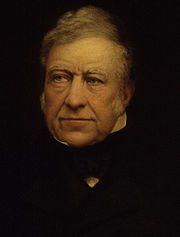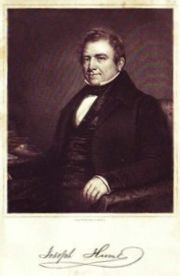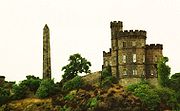
Joseph Hume
Encyclopedia

Scotland
Scotland is a country that is part of the United Kingdom. Occupying the northern third of the island of Great Britain, it shares a border with England to the south and is bounded by the North Sea to the east, the Atlantic Ocean to the north and west, and the North Channel and Irish Sea to the...
doctor and Radical
Radicals (UK)
The Radicals were a parliamentary political grouping in the United Kingdom in the early to mid 19th century, who drew on earlier ideas of radicalism and helped to transform the Whigs into the Liberal Party.-Background:...
MP
Member of Parliament
A Member of Parliament is a representative of the voters to a :parliament. In many countries with bicameral parliaments, the term applies specifically to members of the lower house, as upper houses often have a different title, such as senate, and thus also have different titles for its members,...
, born in Montrose, Angus
Montrose, Angus
Montrose is a coastal resort town and former royal burgh in Angus, Scotland. It is situated 38 miles north of Dundee between the mouths of the North and South Esk rivers...
.
Medical career
He studied medicine at the University of EdinburghUniversity of Edinburgh
The University of Edinburgh, founded in 1583, is a public research university located in Edinburgh, the capital of Scotland, and a UNESCO World Heritage Site. The university is deeply embedded in the fabric of the city, with many of the buildings in the historic Old Town belonging to the university...
and moved to India in 1797. There, he was commissioned as a surgeon
Surgery
Surgery is an ancient medical specialty that uses operative manual and instrumental techniques on a patient to investigate and/or treat a pathological condition such as disease or injury, or to help improve bodily function or appearance.An act of performing surgery may be called a surgical...
to an Army regiment
Regiment
A regiment is a major tactical military unit, composed of variable numbers of batteries, squadrons or battalions, commanded by a colonel or lieutenant colonel...
, and was able to take up work as interpreter and commissary-general due to his knowledge of Indian languages.
His knowledge of chemistry helped him provide the administration to recover damp gunpowder in 1802, on the eve of Lord Lake
Gerard Lake, 1st Viscount Lake
General Gerard Lake, 1st Viscount Lake was a British general. He commanded British forces during the Irish Rebellion of 1798 and later served as Commander-in-Chief of the military in British India.-Background:...
's Maratha war
Second Anglo-Maratha War
The Second Anglo-Maratha War was the second conflict between the British East India Company and the Maratha Empire in India.-Background:...
. In 1808, he resigned and returned home with a fortune of about £40,000.
Between 1808 and 1811, he travelled around England and Europe and ,in 1812, published a blank verse
Blank verse
Blank verse is poetry written in unrhymed iambic pentameter. It has been described as "probably the most common and influential form that English poetry has taken since the sixteenth century" and Paul Fussell has claimed that "about three-quarters of all English poetry is in blank verse."The first...
translation of The Inferno.
Political career
In 1812, he purchased a seat in ParliamentParliament
A parliament is a legislature, especially in those countries whose system of government is based on the Westminster system modeled after that of the United Kingdom. The name is derived from the French , the action of parler : a parlement is a discussion. The term came to mean a meeting at which...
for Weymouth
Weymouth and Melcombe Regis (UK Parliament constituency)
Weymouth and Melcombe Regis was a parliamentary borough in Dorset represented in the English House of Commons, later in that of Great Britain, and finally in the Parliament of the United Kingdom. It was formed by an Act of Parliament of 1570 which amalgamated the existing boroughs of Weymouth and...
, Dorset
Dorset
Dorset , is a county in South West England on the English Channel coast. The county town is Dorchester which is situated in the south. The Hampshire towns of Bournemouth and Christchurch joined the county with the reorganisation of local government in 1974...
, England, and voted as a Tory. When the parliament was dissolved the patron refused to return his money, and Hume brought an action to recover part of it. Six years later, Hume again entered the House, and made acquaintance with James Mill
James Mill
James Mill was a Scottish historian, economist, political theorist, and philosopher. He was a founder of classical economics, together with David Ricardo, and the father of influential philosopher of classical liberalism, John Stuart Mill.-Life:Mill was born at Northwater Bridge, in the parish of...
and the philosophical reformers of the school of Jeremy Bentham
Jeremy Bentham
Jeremy Bentham was an English jurist, philosopher, and legal and social reformer. He became a leading theorist in Anglo-American philosophy of law, and a political radical whose ideas influenced the development of welfarism...
. He joined with Francis Place
Francis Place
Francis Place was an English social reformer.-Early career and influence:Born in the debtor's prison which his father oversaw near Drury Lane, Place was schooled for ten years before being apprenticed to a leather-breeches maker. At eighteen he was an independent journeyman, and in 1790 was...
, of Westminster
Westminster
Westminster is an area of central London, within the City of Westminster, England. It lies on the north bank of the River Thames, southwest of the City of London and southwest of Charing Cross...
, and other philanthropist
Philanthropist
A philanthropist is someone who engages in philanthropy; that is, someone who donates his or her time, money, and/or reputation to charitable causes...
s, to help improve the condition of the working classes, labouring especially to establish schools for them on the Lancastrian system, and forming savings bank
Savings bank
A savings bank is a financial institution whose primary purpose is accepting savings deposits. It may also perform some other functions.In Europe, savings banks originated in the 19th or sometimes even the 18th century. Their original objective was to provide easily accessible savings products to...
s.
In 1818, soon after his marriage with Miss Burnley, the daughter of an East India Company
British East India Company
The East India Company was an early English joint-stock company that was formed initially for pursuing trade with the East Indies, but that ended up trading mainly with the Indian subcontinent and China...
director, he was returned to Parliament as member for the Aberdeen Burghs
Aberdeen Burghs (UK Parliament constituency)
Aberdeen Burghs was a district of burghs constituency which was represented from 1708 to 1800 in the House of Commons of the Parliament of Great Britain, and from 1801 to 1832 in the House of Commons of the Parliament of the United Kingdom...
, Borders
Scottish Borders
The Scottish Borders is one of 32 local government council areas of Scotland. It is bordered by Dumfries and Galloway in the west, South Lanarkshire and West Lothian in the north west, City of Edinburgh, East Lothian, Midlothian to the north; and the non-metropolitan counties of Northumberland...
, Scotland. He was afterwards successively elected for Middlesex
Middlesex (UK Parliament constituency)
Middlesex is a former United Kingdom Parliamentary constituency. It was a constituency of the House of Commons of the Parliament of England then of the Parliament of Great Britain from 1707 to 1800 and of the Parliament of the United Kingdom from 1801 to 1885....
, England (1830), Kilkenny
Kilkenny City (UK Parliament constituency)
Kilkenny City was an Irish Borough constituency in the House of Commons of the United Kingdom of Great Britain and Ireland, returning one Member of Parliament...
, Ireland (1837) and for the Montrose Burghs, Montrose, Scotland (1842), in the service of which constituency he died.
Political campaigns

Chancellor of the Exchequer
The Chancellor of the Exchequer is the title held by the British Cabinet minister who is responsible for all economic and financial matters. Often simply called the Chancellor, the office-holder controls HM Treasury and plays a role akin to the posts of Minister of Finance or Secretary of the...
no peace. He exercised a check on extravagance, and helped to abolish the sinking fund
Sinking fund
A sinking fund is a fund established by a government agency or business for the purpose of reducing debt by repaying or purchasing outstanding loans and securities held against the entity. It helps keep the borrower liquid so it can repay the bondholder....
. It was he who caused the word "retrenchment" to be added to the Radical programme "peace and reform." He carried on a successful warfare against the old anti-trade union combination laws that hampered workmen and favoured masters. He brought about the repeal of the laws prohibiting the export of machinery, and of the act preventing workmen from going abroad. He constantly protested against flogging in the army, the impressment
Impressment
Impressment, colloquially, "the Press", was the act of taking men into a navy by force and without notice. It was used by the Royal Navy, beginning in 1664 and during the 18th and early 19th centuries, in wartime, as a means of crewing warships, although legal sanction for the practice goes back to...
of sailors and imprisonment for debt.
He was conspicuous in the agitation raised by the so-called Orange plot to set aside William IV of the United Kingdom
William IV of the United Kingdom
William IV was King of the United Kingdom of Great Britain and Ireland and of Hanover from 26 June 1830 until his death...
in favour of Ernest Augustus I of Hanover
Ernest Augustus I of Hanover
Ernest Augustus I was King of Hanover from 20 June 1837 until his death. He was the fifth son and eighth child of George III, who reigned in both the United Kingdom and Hanover...
(1835 and 1836). His action as trustee for the notorious Greek loan in 1824 was at least not delicate, and was the ground of charges of downright dishonesty.

Obelisk
An obelisk is a tall, four-sided, narrow tapering monument which ends in a pyramid-like shape at the top, and is said to resemble a petrified ray of the sun-disk. A pair of obelisks usually stood in front of a pylon...
of grey-black sandstone
Sandstone
Sandstone is a sedimentary rock composed mainly of sand-sized minerals or rock grains.Most sandstone is composed of quartz and/or feldspar because these are the most common minerals in the Earth's crust. Like sand, sandstone may be any colour, but the most common colours are tan, brown, yellow,...
blocks, and is inscribed with the names of the five men:
- Thomas Muir
- Joseph GerraldJoseph GerraldJoseph Gerrald was a political reformer, one of the "Scottish Martyrs".-Early life:Gerrald was born on Saint Kitts, in the West Indies, the only son of an Irish planter. Gerrald was brought to England whilst still a child and educated at Stanmore school, under Dr. Samuel Parr, where he showed...
- Thomas Fyshe PalmerThomas Fyshe PalmerThomas Fyshe Palmer was an English-born Unitarian minister, political reformer and political exile.-Early life:Palmer was born in Ickwell, Bedfordshire, England, the son of Henry Fyshe who assumed the added name of Palmer because of an inheritance, and Elizabeth, daughter of James Ingram of...
- William SkirvingWilliam SkirvingWilliam Skirving was one of the five Scottish Martyrs for Liberty. Active in the cause of universal franchise and other reforms inspired by the French Revolution, they were convicted of sedition in 1793-94, and sentenced to transportation to New South Wales.-Early life and farming:William Skirving...
and - Maurice MargarotMaurice MargarotMaurice Margarot is most notable for being one of the founding members of the London Corresponding Society, a radical society demanding parliamentary reform in the late eighteenth century.-Early life:...
On 21 August, 1844, 3000 gathered to see Hume lay the monument's foundation stone at the Old Calton Cemetery
Old Calton Cemetery
Old Calton Cemetery is a graveyard in Edinburgh, Scotland. It is located on Calton Hill, to the north-east of the city centre. The burial ground was opened in 1718, and is the resting place of several notable Edinburgh persons, including philosopher David Hume, publisher William Blackwood and...
, Edinburgh.
On February 1852, a second monument to the Scottish Political Martyrs, again initiated by Hume, was unveiled at Nunhead Cemetery, London.
Legacy
A memorial of Hume was published by his son Joseph Burnley Hume (London, 1855). Another son, Allan Octavian HumeAllan Octavian Hume
Allan Octavian Hume was a civil servant, political reformer and amateur ornithologist in British India. He was one of the founders of the Indian National Congress, a political party that was later to lead the Indian independence movement...
, a renowned ornithologist, also went into the Indian Civil Service and was involved in much political activism during his career, especially on behalf of India, and founded the Indian National Congress
Indian National Congress
The Indian National Congress is one of the two major political parties in India, the other being the Bharatiya Janata Party. It is the largest and one of the oldest democratic political parties in the world. The party's modern liberal platform is largely considered center-left in the Indian...
.
According to Hawkins' History of the Silver Coinage of England, a groat
Groat
Groat or Fuppence is the traditional name of an English silver coin worth four English pence, and also a Scottish coin originally worth fourpence, with later issues being valued at eightpence and one shilling.-Name:...
was known as a "Joey", "so called from Joseph Hume, M.P., who strongly recommended the coinage for the sake of paying short cab-fares, etc."
A statue of Hume stands in the High Street of Montrose, at its intersection with Hume Street .

